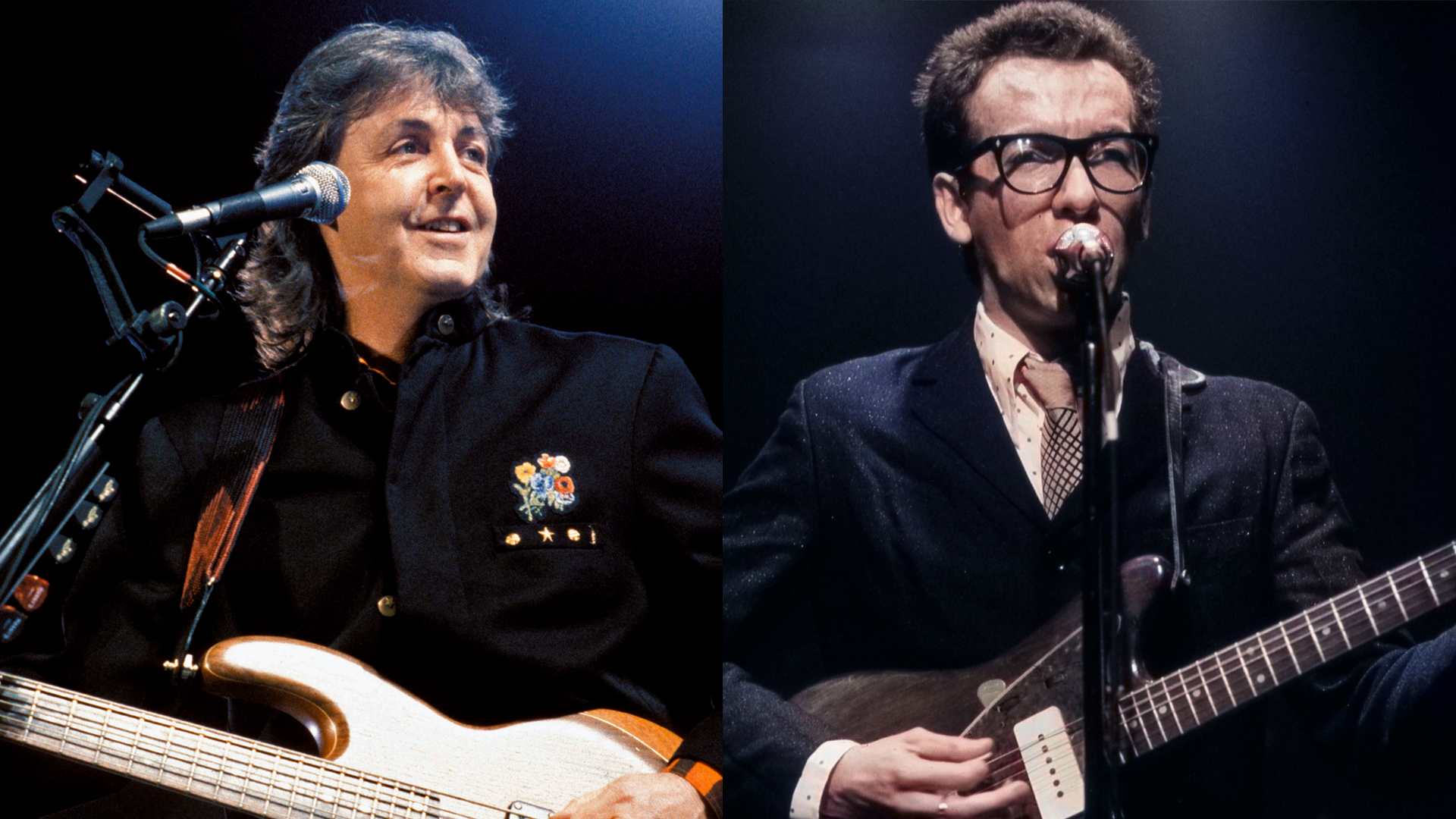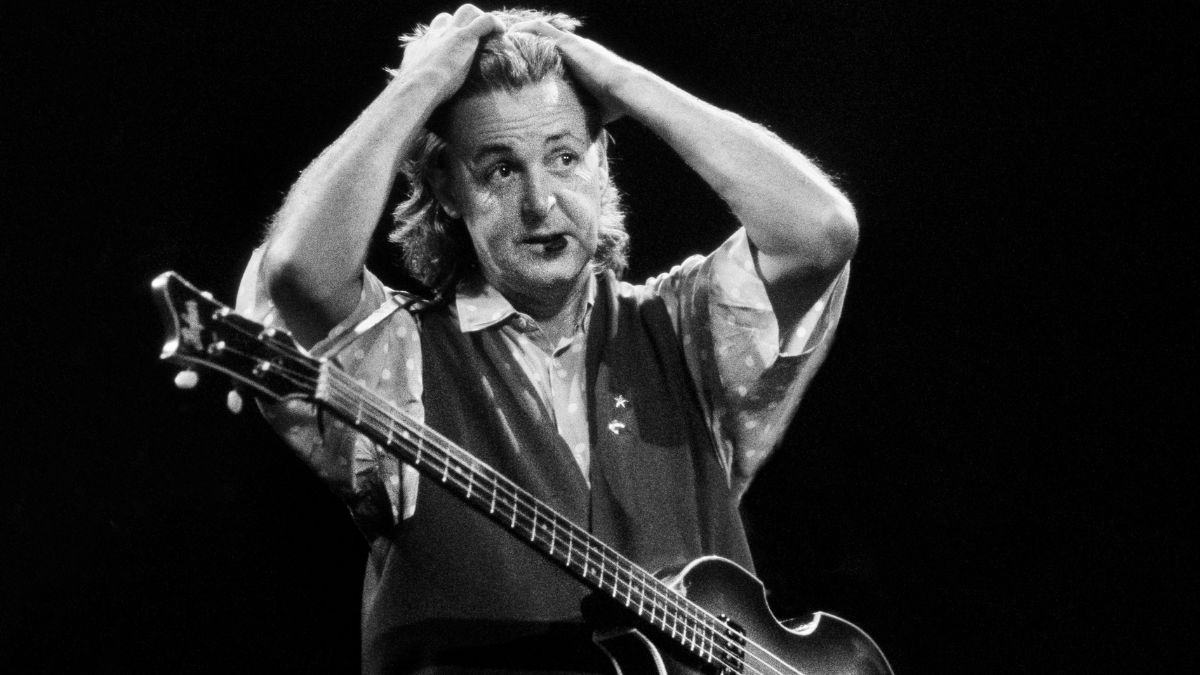“Take them all together and they're not exactly a cheery bunch of songs.” How Elvis Costello helped Paul McCartney find his inner darkness in a decade of mediocrity
As the ‘90s dawned, Macca's hit-and-miss solo career needed a shot in the arm. A partnership with rock's sharpest wit seemed made to order

After years of working alongside John Lennon in the Beatles, Paul McCartney found his second life in music somewhat less fruitful. He had numerous hits as a solo artist, with his wife Linda, and with their band, Wings. All 23 of that group's singles broke the U.S. top 40, with 12 making it into the top 10. It was some vindication for McCartney, who'd found it harder to position himself in the post-Beatles era than John Lennon had.
But by the mid 1980s, McCartney seemed to be stuck in a rut. His catalog from that decade was dotted with both mediocre fare ("Take It Away," the Stevie Wonder duet "Ebony and Ivory") and cloying dreck ("Let 'Em In," "So Bad" and the unfortunate Michael Jackson collaboration "The Girl Is Mine").
When his 1986 album Press to Play failed to ignite the charts, McCartney knew it was time to take stock of his career. He spent the next two years working on its follow-up, 1989's Flowers in the Dirt. And to get things off to a good start, he sought a collaboration with one of the era's most celebrated composers: Elvis Costello.
The move was instantly celebrated, not only because of Costello's songwriting chops but also because of his perceived similarities to John Lennon. Costello's songwriting could be both nakedly honest, confessional and, not occasionally, cruel. His lyrics frequently cut even closer to the bone, with cynical explications on doomed relationships and moral failings, all of it described with clever wordplay and a taste for the jugular.
But while fans assumed Costello would bring the darkness to McCartney's light, he was in fact a conduit for the former Beatles' own introspective and even gloomy disposition.
“He’s thought to be Mr. Sunny,” Costello has said of McCartney. “But he’s got his dark moments, and I like that and really encouraged it. People might attribute that to me, but he seems to be able to involve that darker side that's there.”

Costello had no reservations about answering McCartney's call to collaborate. But given Macca's previous duets with Michael Jackson, he wasn't completely sure what he had in mind.
All the latest guitar news, interviews, lessons, reviews, deals and more, direct to your inbox!
“When I got the call to say Paul wanted me to write some songs with him for his next record, I didn’t know what to expect,” he revealed. “But as his last co-written hit had been with Michael Jackson, I wondered whether I should be taking some dancing lessons.”
Even ‘My Brave Face’, which was quite a bright-sounding pop song, is about a guy who's been left by his lover
— Elvis Costello
Those doubts were ultimately cast aside, and Costello committed to the album. And as he discovered, the former Beatle required no prodding when it came to taking on theme ranging from failed relationships ("My Brave Face") to death {"That Day is Done").
“I haven't got my arm up his back when we're writing,” Costello explained. “Even ‘My Brave Face,’ which was quite a bright-sounding pop song, is about a guy who's been left by his lover. ‘So Like Candy’" — a tune that ultimately appeared on Costello's 1991 solo album, Mighty Like a Rose — "is about the debris of a relationship. ‘That Day Is Done’ is about a funeral.
"Take them all together and they're not exactly a cheery bunch of songs.”
Admittedly, Flowers in the Dirt didn't blow critics away, but it was received as a return to form.
The McCartney–Costello partnership would spill over into Costello’s work, too. In addition to "So Like Candy," their co-write “Veronica” found life in Costello's catalog when it appeared on his 1989 album Spike, and even brought him some chart success. Costello had penned its lyrics to document what he describes as the “terrifying moments of lucidity” he saw his grandmother succumb to as she battled Alzheimer’s in her final years.
But he had no desire to wallow in sentimentality.
“I didn't want to write the sad, mournful song about her,” Costello told Opie Radio. “I wanted to write something bright and optimistic sounding. Paul saw what I was trying to do, and he looked at it as a craftsman's job; he could make it better.”
Which just serves as a reminder that Macca wasn't the only one who benefitted from the partnership. Ultimately their brief collaboration would be viewed as giving the lighthearted McCartney a bit of gravity and the wickedly witty Costello a touch of gravitas.
A freelance writer with a penchant for music that gets weird, Phil is a regular contributor to Prog, Guitar World, and Total Guitar magazines and is especially keen on shining a light on unknown artists. Outside of the journalism realm, you can find him writing angular riffs in progressive metal band, Prognosis, in which he slings an 8-string Strandberg Boden Original, churning that low string through a variety of tunings. He's also a published author and is currently penning his debut novel which chucks fantasy, mythology and humanity into a great big melting pot.


